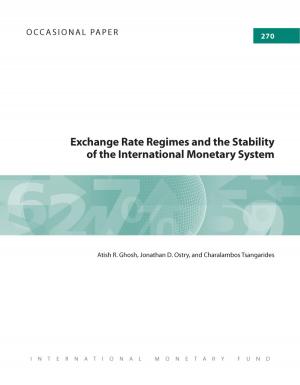How Can Companies Potentially Increase Profit & Contribute To Economic Growth Under Basel III?
A practical guide with Real-life Borrowing Examples, and Recent Economic Researches on US, China, EU and UK.
Business & Finance, Accounting, Management, Financial, Finance & Investing, Banks & Banking| Author: | A. Wong | ISBN: | 9789881241771 |
| Publisher: | The PTI Group | Publication: | January 29, 2015 |
| Imprint: | The PTI Group | Language: | English |
| Author: | A. Wong |
| ISBN: | 9789881241771 |
| Publisher: | The PTI Group |
| Publication: | January 29, 2015 |
| Imprint: | The PTI Group |
| Language: | English |
Aftermath of The Financial Crisis
Since onset of the financial crisis in 2008, economies of various countries are plagued with economic stagnation or even contraction, unemployment, hefty government debts etc. For companies, difficulties in obtaining bank financings, falling customer demand, low capacity utilization are common. Despite QE implemented by some countries, it is not completely effective in easing bank credit (which will also be elaborated in this Book), cumulating in liquidity problems and impinging adversely upon survival of some companies.
With rising capital requirements under Basel III (the new bank capital standard), coupled with tapering of QE3 in US, inter alia, market liquidity is expected to tighten further going forward. This could make companies' access to bank loan even more difficult.
Importance of Bank Credit on the Economy
Based on pre- and post-crisis economic data/researches on US, China, EU and UK, it was found bank credit has more crucial and far-reaching influence than just liquidity for companies, and money supply creation. Bank credit can cast pervasive impact on the whole economy, including export, fixed asset investment, and even competitiveness of a country/jurisdiction etc.
Nevertheless, companies can contribute towards saving capital for their lending banks. Using real-life borrowing examples, this Book has provided practical illustrations of how companies can do so.
In this Book, different definitions of money supply in US, China, EU and UK, and the practical aspects of money creation are also highlighted.
Potential Benefits of Mastering Knowledge in this Book
By equipping readers with knowledge to achieve capital efficiency for banks, it is anticipated:
Ø Companies may be indirectly helping to ease supply of bank credit, as well as to potentially help themselves to save interest costs and increase profit.
Ø Companies could also be aiding banks to improve profitability and return on regulatory capital.
Ø More importantly, it could also contribute potentially towards growth of the economy.
Ø Eventually, it would be win-win situation not only for companies and banks, but also for the economy.
Ø By helping to ease bank credit, companies may contribute indirectly towards enhancing export, innovation & even competitiveness of their country / jurisdiction.
Ø Government officials can gain insights so that appropriate government policies could be designed &/adjusted.
Target Readers
This Book would be valuable to CEOs, CFOs, accountants, senior executives of banks, investment analysts, government officials, policy makers etc., or anyone who does not want to be left behind in practical knowledge in the business world.
Since onset of the financial crisis in 2008, economies of various countries are plagued with economic stagnation or even contraction, unemployment, hefty government debts etc. For companies, difficulties in obtaining bank financings, falling customer demand, low capacity utilization are common. Despite QE implemented by some countries, it is not completely effective in easing bank credit (which will also be elaborated in this Book), cumulating in liquidity problems and impinging adversely upon survival of some companies.
With rising capital requirements under Basel III (the new bank capital standard), coupled with tapering of QE3 in US, inter alia, market liquidity is expected to tighten further going forward. This could make companies' access to bank loan even more difficult.
Importance of Bank Credit on the Economy
Based on pre- and post-crisis economic data/researches on US, China, EU and UK, it was found bank credit has more crucial and far-reaching influence than just liquidity for companies, and money supply creation. Bank credit can cast pervasive impact on the whole economy, including export, fixed asset investment, and even competitiveness of a country/jurisdiction etc.
Nevertheless, companies can contribute towards saving capital for their lending banks. Using real-life borrowing examples, this Book has provided practical illustrations of how companies can do so.
In this Book, different definitions of money supply in US, China, EU and UK, and the practical aspects of money creation are also highlighted.
Potential Benefits of Mastering Knowledge in this Book
By equipping readers with knowledge to achieve capital efficiency for banks, it is anticipated:
Ø Companies may be indirectly helping to ease supply of bank credit, as well as to potentially help themselves to save interest costs and increase profit.
Ø Companies could also be aiding banks to improve profitability and return on regulatory capital.
Ø More importantly, it could also contribute potentially towards growth of the economy.
Ø Eventually, it would be win-win situation not only for companies and banks, but also for the economy.
Ø By helping to ease bank credit, companies may contribute indirectly towards enhancing export, innovation & even competitiveness of their country / jurisdiction.
Ø Government officials can gain insights so that appropriate government policies could be designed &/adjusted.
Target Readers
This Book would be valuable to CEOs, CFOs, accountants, senior executives of banks, investment analysts, government officials, policy makers etc., or anyone who does not want to be left behind in practical knowledge in the business world.
Aftermath of The Financial Crisis
Since onset of the financial crisis in 2008, economies of various countries are plagued with economic stagnation or even contraction, unemployment, hefty government debts etc. For companies, difficulties in obtaining bank financings, falling customer demand, low capacity utilization are common. Despite QE implemented by some countries, it is not completely effective in easing bank credit (which will also be elaborated in this Book), cumulating in liquidity problems and impinging adversely upon survival of some companies.
With rising capital requirements under Basel III (the new bank capital standard), coupled with tapering of QE3 in US, inter alia, market liquidity is expected to tighten further going forward. This could make companies' access to bank loan even more difficult.
Importance of Bank Credit on the Economy
Based on pre- and post-crisis economic data/researches on US, China, EU and UK, it was found bank credit has more crucial and far-reaching influence than just liquidity for companies, and money supply creation. Bank credit can cast pervasive impact on the whole economy, including export, fixed asset investment, and even competitiveness of a country/jurisdiction etc.
Nevertheless, companies can contribute towards saving capital for their lending banks. Using real-life borrowing examples, this Book has provided practical illustrations of how companies can do so.
In this Book, different definitions of money supply in US, China, EU and UK, and the practical aspects of money creation are also highlighted.
Potential Benefits of Mastering Knowledge in this Book
By equipping readers with knowledge to achieve capital efficiency for banks, it is anticipated:
Ø Companies may be indirectly helping to ease supply of bank credit, as well as to potentially help themselves to save interest costs and increase profit.
Ø Companies could also be aiding banks to improve profitability and return on regulatory capital.
Ø More importantly, it could also contribute potentially towards growth of the economy.
Ø Eventually, it would be win-win situation not only for companies and banks, but also for the economy.
Ø By helping to ease bank credit, companies may contribute indirectly towards enhancing export, innovation & even competitiveness of their country / jurisdiction.
Ø Government officials can gain insights so that appropriate government policies could be designed &/adjusted.
Target Readers
This Book would be valuable to CEOs, CFOs, accountants, senior executives of banks, investment analysts, government officials, policy makers etc., or anyone who does not want to be left behind in practical knowledge in the business world.
Since onset of the financial crisis in 2008, economies of various countries are plagued with economic stagnation or even contraction, unemployment, hefty government debts etc. For companies, difficulties in obtaining bank financings, falling customer demand, low capacity utilization are common. Despite QE implemented by some countries, it is not completely effective in easing bank credit (which will also be elaborated in this Book), cumulating in liquidity problems and impinging adversely upon survival of some companies.
With rising capital requirements under Basel III (the new bank capital standard), coupled with tapering of QE3 in US, inter alia, market liquidity is expected to tighten further going forward. This could make companies' access to bank loan even more difficult.
Importance of Bank Credit on the Economy
Based on pre- and post-crisis economic data/researches on US, China, EU and UK, it was found bank credit has more crucial and far-reaching influence than just liquidity for companies, and money supply creation. Bank credit can cast pervasive impact on the whole economy, including export, fixed asset investment, and even competitiveness of a country/jurisdiction etc.
Nevertheless, companies can contribute towards saving capital for their lending banks. Using real-life borrowing examples, this Book has provided practical illustrations of how companies can do so.
In this Book, different definitions of money supply in US, China, EU and UK, and the practical aspects of money creation are also highlighted.
Potential Benefits of Mastering Knowledge in this Book
By equipping readers with knowledge to achieve capital efficiency for banks, it is anticipated:
Ø Companies may be indirectly helping to ease supply of bank credit, as well as to potentially help themselves to save interest costs and increase profit.
Ø Companies could also be aiding banks to improve profitability and return on regulatory capital.
Ø More importantly, it could also contribute potentially towards growth of the economy.
Ø Eventually, it would be win-win situation not only for companies and banks, but also for the economy.
Ø By helping to ease bank credit, companies may contribute indirectly towards enhancing export, innovation & even competitiveness of their country / jurisdiction.
Ø Government officials can gain insights so that appropriate government policies could be designed &/adjusted.
Target Readers
This Book would be valuable to CEOs, CFOs, accountants, senior executives of banks, investment analysts, government officials, policy makers etc., or anyone who does not want to be left behind in practical knowledge in the business world.















